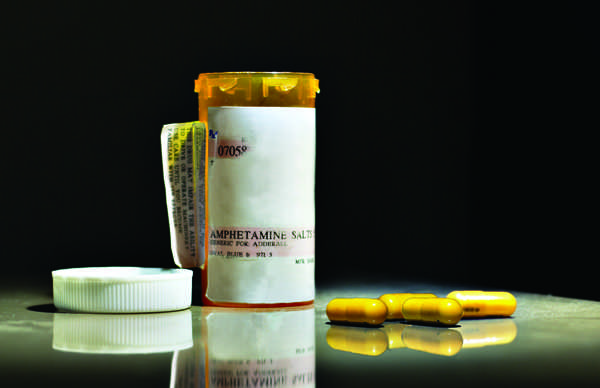If I was in the market for Adderall to prepare for a long night of cramming before an exam, it would take two degrees of separation, $5 and one phone call to get my hands on some.
According to the FDA, “Adderall is a prescription stimulant used to increase attention and decrease impulsiveness and hyperactivity in patients with ADHD.”
For many students at The University of Alabama, Adderall has become an integral part of their academic career because of the accessibility of the drug.
In reporting this story, I sought a different angle, one not based in press releases and official warnings about the dangers of taking unprescribed medication. Sarah was the first of four UA students to whom I talked on the condition of anonymity. Names have been changed so the students would speak with me explicitly.
Sarah was first prescribed Adderall when she was in 7th grade and has recently begun selling to friends. She is able to purchase a generic brand prescription for $5 a bottle at her pharmacy and then resell individual pills for $5 a piece.
“I didn’t start selling it until this year, but it’s definitely harder to get here,” Sarah said. “I have to go for a check up every three months and pay for a doctor’s visit each time.”
During final exams last spring, Sarah’s mother had to send her Adderall in the mail because she was unable to find a pharmacy in Tuscaloosa to refill her prescription. The increased demand of the drug resulted in a depleted stock room and disappointed students.
“Everywhere was sold out,” Sarah said. “I think it was definitely a result of it being exam time and students wanting to get their prescriptions filled so they could sell it, because people will pay, especially around exams, people will pay a lot for them.”
According to the National Survey on Drug Use and Health conducted April 2009, “Full-time college students aged 18 to 22 were twice as likely as their counterparts who were not full-time college students to have used Adderall non-medically in the past year.”
Dr. Mark Thomas at the Student Health Center explained studies have shown that many students who obtain Adderall and other stimulant prescriptions may themselves display symptoms of ADHD and may be better served if they went through the proper evaluation and testing involved when obtaining a legitimate prescription.
“From my perspective, there is too much risk of harm for someone to take medication without a proper assessment and diagnosis being made,” Thomas said. “We have to realize there are potential side effects and dangers, especially for those people that aren’t having it prescribed.”
Thomas said recent studies have shown that the brain is not fully mature until the mid 20s. He attributes the blase attitude of the pill-popping culture to college-age students’ developmental stage.
“I think that most students are still at the stage in their cognitive and emotional development that they feel a sense of invulnerability,” Thomas said. “Even though they may recognize potential harm, there is a disconnect because they don’t identify the risk as being real for themselves; then they don’t use the best of judgements in decision to make choices that could bring harm to themselves.”
Students who may benefit from Adderall but do not fall into the ADD/ADHD category are able to play on the same field as those prescribed to the drug by illegally purchasing individual pills from friends or other students.
“The first time I ever used Adderall was my sophomore year,” Mary, another UA student, said. “I had a lot of school work that I needed to do. My roommate offered me Adderall. I wasn’t nervous because literally all of my friends are prescribed to it and take it on a daily basis.”
Mary said the drug’s availability and common place on campus desensitizes students to its illegality without a prescription.
“It is not difficult at all to get it,” Mary said. “I don’t think it’s a big deal, but I do think it’s very negative that I don’t think it’s a big deal. It’s just so common that it doesn’t even cross my mind that it’s a bad thing. It’s everywhere. Everyone is either prescribed to it or gets it from the other half of the students that are prescribed to it.”
Students may have grown apathetic to prescription medication because of the increased accessibility, but for some, heightened drug dependence may be a result of the increasingly competitive nature students face in the classroom and later in the job market.
“I think it’s morally wrong to take a pill that’s not prescribed to you,” Jake, another UA student, said. “At the same time, I realize I’m at a competitive university vying for very few job slots, so I feel like I have to take pills to help my performance.”
Jake began taking Adderall as a study supplement before finals his freshman year. He usually buys it from friends that have prescriptions on weeks he knows will be work-heavy and short on sleep.
“I think [Adderall] has been a big part of my academic career at this point, and I see it continuing to be a big part,” Jake said. “I’d say [taking unprescribed medication] is a big deal, but I don’t view it as an unfair advantage because I know the people I am competing with in the job market are taking it and taking it legally and taking it lightly.”
At the Capstone, it is considered a felony to distribute prescription medication, one that could possibly result in suspension from the University. Many students have become apathetic to the dangers of unprescribed medication and feel it is easy to get around barriers such as legitimate doctor’s visits to obtain drugs considered necessary for academic success.
“It’s so easy,” Sarah said. “If you want it, you either have friends that are prescribed or you can find someone else. Everyone has it, or everyone has access to it.”









